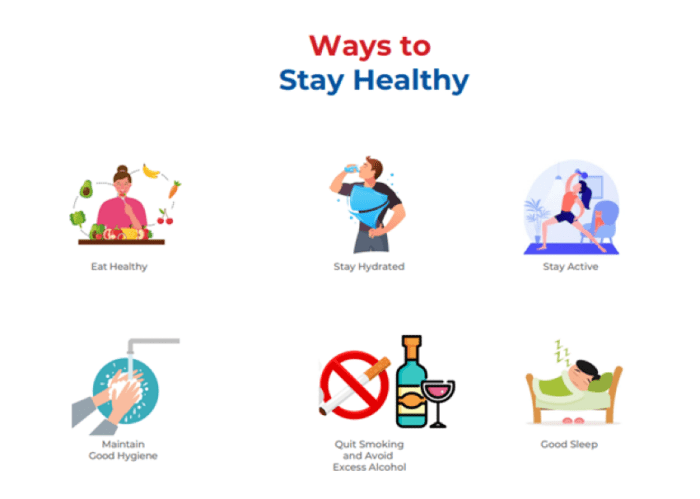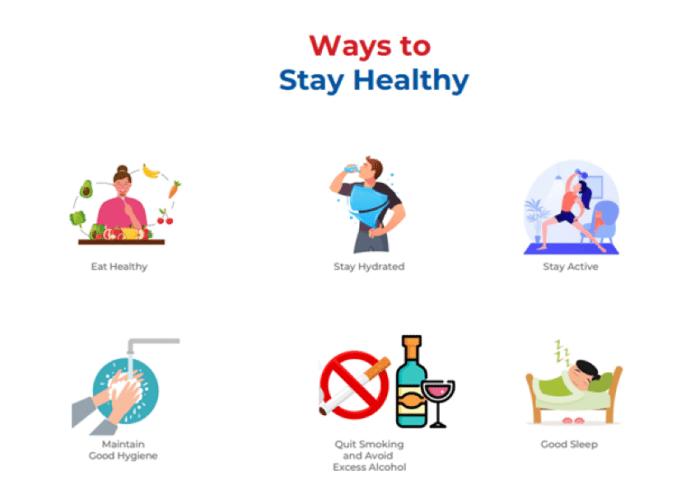Healthy Lifestyle Tips: Get ready to dive into the world of wellness and vitality as we explore key tips for a healthier lifestyle. From nutrition to fitness, stress management to hydration, this guide has got you covered. Let’s rock this journey together!
Benefits of a Healthy Lifestyle: Healthy Lifestyle Tips

Leading a healthy lifestyle offers a plethora of benefits that positively impact both physical and mental well-being. By making conscious choices to prioritize health, individuals can experience a wide range of advantages that enhance their overall quality of life.
Physical Benefits
- Improved cardiovascular health: Regular exercise and a balanced diet can lower the risk of heart disease, stroke, and high blood pressure.
- Weight management: Maintaining a healthy weight reduces the likelihood of obesity-related conditions such as diabetes and joint issues.
- Enhanced immune system: Nutrient-rich foods and adequate sleep strengthen the body’s ability to fight off infections and illnesses.
- Increased energy levels: Engaging in physical activity boosts stamina and reduces feelings of fatigue throughout the day.
Mental Health Advantages
- Reduced stress and anxiety: Exercise releases endorphins, which act as natural mood lifters and stress relievers.
- Improved cognitive function: A healthy lifestyle can enhance memory, focus, and overall brain function.
- Better sleep quality: Regular physical activity and a balanced diet contribute to improved sleep patterns and overall restfulness.
- Boosted self-esteem: Achieving health goals and feeling good physically can increase confidence and self-worth.
Overall Well-being
- Increased longevity: Research shows that individuals who lead healthy lifestyles tend to live longer, fulfilling lives.
- Enhanced quality of life: By prioritizing health, individuals can enjoy more energy, vitality, and resilience in the face of challenges.
- Reduced risk of chronic diseases: Making healthy choices decreases the likelihood of developing conditions such as cancer, diabetes, and heart disease.
- Improved mental clarity: A healthy lifestyle can lead to better focus, productivity, and overall mental well-being.
Nutrition and Diet Tips
Eating a well-balanced and nutritious diet is crucial for maintaining good health and overall well-being. It not only provides essential nutrients for your body but also helps in preventing various diseases. Portion control plays a key role in managing weight and ensuring you don’t overeat. Including superfoods in your diet can further enhance your health by providing additional benefits. Mindful eating is another important aspect to consider, as it helps you to be more aware of your food choices and eating habits.
Creating a Balanced and Nutritious Diet, Healthy Lifestyle Tips
- Include a variety of fruits and vegetables in your meals to ensure you get a wide range of vitamins and minerals.
- Incorporate whole grains like quinoa, brown rice, and oats for fiber and sustained energy.
- Choose lean proteins such as chicken, fish, tofu, and legumes to support muscle growth and repair.
- Limit processed foods, sugary beverages, and high-fat snacks to reduce the intake of empty calories.
Importance of Portion Control
- Use smaller plates to help control portion sizes and prevent overeating.
- Measure out servings of foods like rice, pasta, and protein to avoid consuming more than needed.
- Be mindful of portion sizes when dining out and consider sharing meals or taking leftovers home.
- Listen to your body’s hunger and fullness cues to stop eating when satisfied, not stuffed.
Examples of Superfoods
- Blueberries: Packed with antioxidants that help fight inflammation and improve brain function.
- Salmon: Rich in omega-3 fatty acids that support heart health and reduce the risk of chronic diseases.
- Kale: A nutrient-dense leafy green that provides vitamins A, C, and K, along with minerals like calcium and iron.
- Chia seeds: High in fiber, protein, and omega-3s, promoting digestive health and reducing cholesterol levels.
Mindful Eating for a Healthy Lifestyle
- Avoid distractions while eating, such as watching TV or scrolling on your phone, to focus on your meal.
- Chew your food slowly and savor each bite to appreciate the flavors and textures.
- Pay attention to feelings of hunger and fullness to prevent mindless snacking and overeating.
- Be aware of emotional triggers that may lead to unhealthy eating habits and find alternative ways to cope.
Exercise and Fitness Recommendations
Regular physical activity is crucial for maintaining overall health and well-being. It not only helps in managing weight but also reduces the risk of chronic diseases such as heart disease, diabetes, and certain types of cancers. Incorporating exercise into your daily routine can have a significant impact on your quality of life.
Different Types of Exercises Suitable for Various Fitness Levels
- Low-intensity exercises like walking, yoga, or gentle stretching are perfect for beginners or those with mobility issues.
- Moderate-intensity activities such as swimming, cycling, or brisk walking can help improve cardiovascular health and stamina.
- High-intensity workouts like running, HIIT (High-Intensity Interval Training), or weightlifting are great for more advanced individuals looking to challenge themselves.
Benefits of Regular Physical Activity on Overall Health
Regular exercise can improve mood, boost energy levels, enhance sleep quality, and strengthen the immune system.
- It helps in maintaining a healthy weight and reducing the risk of obesity-related conditions.
- Exercise promotes better cardiovascular health by improving circulation and lowering blood pressure.
- Physical activity can increase muscle strength, flexibility, and bone density, reducing the risk of injuries and osteoporosis.
Tips for Incorporating Exercise into a Busy Lifestyle
- Schedule your workouts like appointments and treat them as non-negotiable commitments.
- Choose activities that you enjoy and mix them up to prevent boredom and stay motivated.
- Consider short, high-intensity workouts or mini-exercise sessions throughout the day to fit in movement even on hectic days.
- Include physical activities in your daily routine, such as taking the stairs instead of the elevator or walking during phone calls.
Examples of How to Create a Personalized Fitness Plan
| Goal | Activities | Frequency | Duration |
|---|---|---|---|
| Weight loss | Cardio, strength training, and HIIT | 5 days a week | 30-60 minutes per session |
| Muscle gain | Weightlifting, resistance training | 3-4 days a week | 45-75 minutes per session |
| Overall fitness | Combination of cardio, strength, and flexibility exercises | 4-6 days a week | 20-60 minutes per session |
Stress Management Techniques

Stress can have a significant impact on both physical and mental health, leading to issues such as high blood pressure, anxiety, depression, and even heart disease. It is crucial to manage stress effectively to maintain overall well-being.
Meditation and Deep Breathing Exercises
Engaging in meditation and deep breathing exercises can help reduce stress levels by calming the mind and body. Taking time to focus on breathing and being present in the moment can promote relaxation and alleviate feelings of tension and anxiety.
- Practice deep breathing exercises by inhaling deeply through your nose, holding for a few seconds, and exhaling slowly through your mouth. Repeat this process several times to help calm your mind.
- Try incorporating mindfulness meditation into your daily routine to help reduce stress and improve overall mental well-being. Find a quiet space, close your eyes, and focus on your breath or a specific mantra to center yourself.
- Consider guided meditation apps or classes to help you establish a regular meditation practice and reap the benefits of reduced stress and increased mindfulness.
Importance of Adequate Sleep
Getting enough quality sleep is essential for managing stress effectively. Lack of sleep can exacerbate feelings of stress and anxiety, making it challenging to cope with daily challenges.
- Aim for 7-9 hours of quality sleep each night to allow your body and mind to rest and recharge.
- Create a relaxing bedtime routine to signal to your body that it’s time to wind down, such as reading a book, taking a warm bath, or practicing relaxation techniques.
- Avoid caffeine, electronics, and stimulating activities before bedtime to ensure a restful night’s sleep and better stress management.
Maintaining a Healthy Work-Life Balance
Balancing work responsibilities with personal life is crucial for reducing stress levels and preventing burnout. Setting boundaries and prioritizing self-care can help you manage stress effectively.
- Establish clear boundaries between work and personal time to prevent work-related stress from spilling over into your personal life.
- Schedule regular breaks throughout the workday to recharge and reset, whether it’s taking a short walk, practicing deep breathing exercises, or engaging in a quick mindfulness practice.
- Make time for activities you enjoy outside of work, such as hobbies, exercise, spending time with loved ones, or pursuing personal interests to maintain a healthy work-life balance and reduce stress levels.
Hydration and Water Intake
Staying hydrated is crucial for overall health as water plays a vital role in various bodily functions. It helps regulate body temperature, aids digestion, flushes out toxins, and keeps our skin healthy.
Guidelines for Daily Water Intake
- On average, it is recommended to drink about 8-10 cups of water per day.
- Individual needs may vary based on factors like activity level, age, and climate.
- Listen to your body’s signals and drink water when you feel thirsty.
Tips for Increasing Water Consumption
- Carry a reusable water bottle with you throughout the day to remind yourself to drink water.
- Flavor your water with fruits like lemon, cucumber, or berries for a refreshing twist.
- Set reminders on your phone or create a water drinking schedule to ensure you’re staying hydrated.
Effects of Dehydration and Prevention
- Dehydration can lead to symptoms like fatigue, dizziness, headaches, and dry skin.
- Drink water regularly throughout the day to prevent dehydration.
- Aim to drink water before, during, and after exercise, as well as in hot weather to replenish lost fluids.
